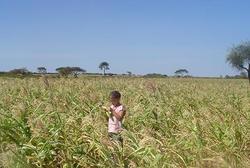Anyuak Media | April 11, 2011
By Nyikaw Ochalla
In his recent article in the Guardian, Land deals in Ethiopia bring food self-sufficiency, and prosperity, the Ethiopian Ambassador to the UK HE Berhanu Kebede, a high diplomatic mission official and well informed person, makes a futile attempt to justify the Ethiopian government's land grab deals. He provides no evidence however to challenge the overwhelming local and international condemnation of this large-scale commercial agriculture hand over in a country of over 80 million people with a history of conflict, recurrent famine and drought.
The article makes some basic factual errors. It claims a substantial success in the achievement of food self sufficiency, with a reduction of the number of Ethiopians in need of food hand outs from 5.2 million to 2.8 million since the previous year. An estimated 46% reduction in the needy population according to UN humanitarian Coordinator for Ethiopia failed to take into account environmental factors beyond the reach of authorities and policy makers.
In a usual fashion, the article lists numerous benefits the country will see if the agricultural sector is to develop in line with the medium and long term government objectives. "Development" is a colourful word used by the government for over two decades to attract funding in all sectors. It has facilitated a massive flow of reconstruction funds by donor countries, international organisations including World Bank, UNICEF, IMF, UNDP and sectoral NGOs. Some of the sectors that have received financial support include education, health, water facilities and the transport sector. In the education sector, the government reported a 125% gross enrolment rate in 2004/2005 academic year for Amhara and Gambela regions.
In Gambela, the number of schools and the attendance rates had already risen sharply by the time I left the country in 1999. The cumulative budget in the sector can be estimated in the millions if not billions of foreign currency-USD. But this vital investment in social services will soon become a waste as the beneficiaries are to be relocated to other sites to facilitate large-scale agriculture projects and to start construction over again with the government's new "villagisation" programme. Is the Ambassador not aware of such massive investments in the past?
The crux of the matter is that the regime has run out of steam for attracting foreign funds. The only remaining card on the table is the same one that it has been exploiting over and over again since it took power. But this time the development phrase exposes the regime more than it convinces; the policies are not only destructive but also at odds with the needs of a country of over 80 million people and a history of recurrent famine and drought.
The cycle of claim in the name of development, however, will continue every time new economic resources are discovered and the demand for those resources rises locally, nationally or internationally. This is exactly the case when the government saw a market for agricultural land with the rise in stable food prices internationally in 2008.
It is shameful that the Ambassador would claim that the areas targeted for foreign investment have no adequate social and economic infrastructures such as education, health facilities and roads. Local populations are being removed from Ilea, Perbongo and Okuna for instance. All these areas not only have had education and health facilities for decades but also have had all-weather roads connecting them to the regional capital since the military regime. The only reason these people are being moved is to make way for the rush for agricultural land in the interest of high investment returns which sustains the regime's illegal and destructive activities in the country. Another reason is for the regime to secure protection from its allies and business partners against the reality of abject poverty and ecological and environmental destruction.
What are we to make of the claims made by the Ambassador? Does this suggest a deliberate effort on the part of the Ethiopian government to keep its diplomatic mission and high level figures in the dark about the real events unfolding in the country? Or else, like the regime he represents, which remains distant from public opinion, is he deliberately misguiding international audiences so as to secure funding for his government's unproductive and unsustainable development projects?













